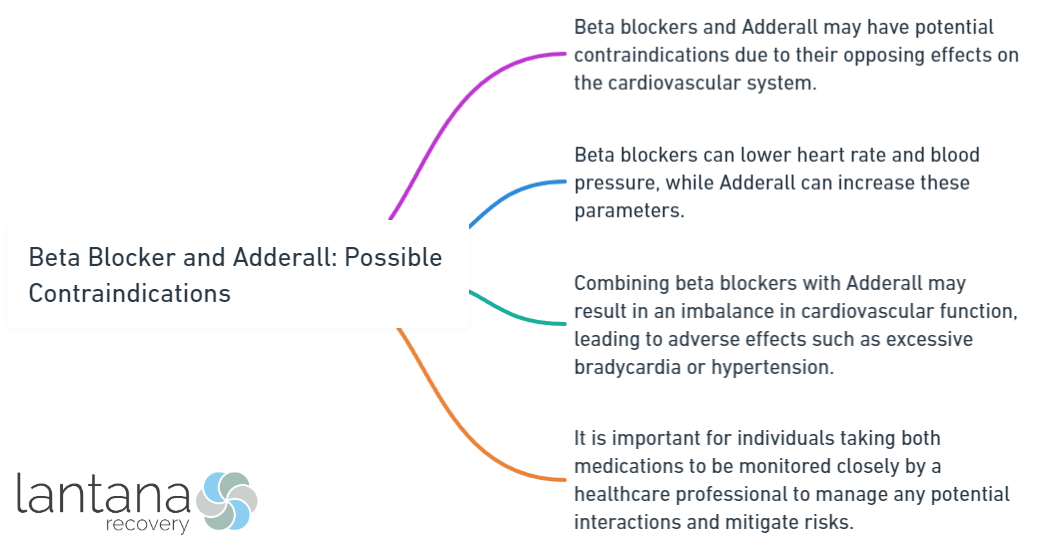Beta blockers and Adderall are commonly prescribed medications used to treat different medical conditions. However, the combination of these two drugs may pose potential contraindications that need to be considered. It is essential to understand what beta blockers and Adderall are, what a contraindication means, and whether these medications can be taken together.
Beta blockers are a class of medications that block the effect of adrenaline, mainly used to treat conditions like high blood pressure, heart rhythm problems, and migraines. On the other hand, Adderall is a prescription stimulant used to manage attention deficit hyperactivity disorder (ADHD) and narcolepsy.
A contraindication refers to a situation or condition in which the use of a specific medication or treatment is not advisable due to potential risks or adverse effects. It is important to note that combining beta blockers and Adderall may not always be recommended and should be done under careful medical supervision.
When beta blockers and Adderall are combined, they may interact and produce unwanted effects. These effects can vary depending on individual factors, such as the dosage, duration of use, and personal medical history. Some possible contraindications of combining beta blockers and Adderall include increased blood pressure, elevated heart rate, changes in blood sugar levels, and an increased risk of side effects.
If you are taking beta blockers and Adderall or considering this combination, it is crucial to consult your doctor. Your healthcare provider can guide you on the potential risks and benefits based on your specific medical condition and history. They can discuss alternative treatment options or adjust the dosage of the medications if necessary.
Monitoring your health is also important while taking beta blockers and Adderall. Keep track of any changes in blood pressure, heart rate, or blood sugar levels. Be aware of any unusual side effects and report them to your healthcare provider promptly.
Understanding the possible contraindications of combining beta blockers and Adderall is crucial for ensuring your safety and well-being. Always follow your doctor’s guidance and communicate any concerns or questions you may have regarding your medication regimen.

What Are Beta Blockers and Adderall?
Beta-blockers and Adderall are medications commonly used in the medical field. Beta-blockers block the effects of adrenaline on the body. They are prescribed to treat high blood pressure, heart rhythm disorders, angina, migraines, and certain types of anxiety. They lower heart rate and blood pressure, which benefits individuals with these conditions. On the other hand, Adderall contains amphetamine salts and is prescribed to treat attention deficit hyperactivity disorder (ADHD) and narcolepsy. It increases the levels of certain chemicals in the brain that improve focus and attention. It helps individuals with ADHD improve concentration and control impulsive behaviors.
Both beta-blockers and Adderall should only be taken under the guidance of a healthcare professional. It is important to follow the prescribed dosage and any instructions from the doctor.
Pro-tip: If you have questions or concerns about beta blockers or Adderall, consult with a healthcare professional like those at Lantana Recovery for personalized advice based on your needs and medical history. We recommend researching and taking time to study educational resources on your medication to learn the basics like when they expire, alternatives, and how they work.
What is a Contraindication?
A contraindication is a situation or condition where a treatment or medication should not be used. Understanding contraindications is important for patient safety and to avoid harm. Contraindications are based on scientific evidence and experience and are established to prevent complications.
Healthcare professionals need to be aware of contraindications when prescribing medication or recommending treatments. Contraindications can vary depending on the medication, treatment, and patient’s characteristics. For example, if a patient is allergic to a medication, it should not be prescribed to them. Similarly, if a treatment could worsen a medical condition, it should not be used.
Can Beta Blockers and Adderall Be Taken Together?
When considering whether or not beta blockers and Adderall can be taken together, it is important to understand the potential interactions and effects. Combining these medications can be dangerous as beta blockers lower blood pressure while Adderall increases it. This combination can increase the risk of heart-related side effects.
Additionally, beta-blockers may reduce the effectiveness of Adderall in managing symptoms. Individual factors such as overall health, medical history, and dosage can also influence the interaction between these medications.
It is strongly advised to not take beta blockers and Adderall together without medical guidance. It is crucial to consult with a healthcare professional for personalized advice on whether or not these medications can be taken together.
What Happens When Beta Blockers and Adderall Are Combined?
Combining beta blockers and Adderall can lead to several interactions that affect the body, including changes in blood pressure, elevation of heart rate, fluctuations in blood sugar levels, and an increased risk of side effects. When taken together, beta-blockers may have reduced blood pressure-lowering effects due to the counteracting effect of Adderall’s blood pressure-increasing side effects. Moreover, Adderall’s stimulating properties may counteract the heart rate-slowing effects of beta blockers, resulting in an elevated heart rate.
Additionally, Adderall’s ability to increase blood sugar levels can make it challenging to effectively monitor and control blood sugar, as beta blockers can mask the symptoms of low blood sugar. Furthermore, taking these medications together can increase the likelihood of experiencing side effects associated with both beta blockers and Adderall.
“Psychostimulants are often combined with other medications in both short-term and long-term treatment strategies for ADHD” (Pharmacokinetic and Pharmacodynamic Drug Interactions in the Treatment of Attention-Deficit Hyperactivity Disorder, Markowitz & Patrick, 2012.) If you are currently taking beta blockers and Adderall simultaneously, it is crucial to consult with your doctor. Only a healthcare professional can assess your specific situation and provide suitable guidance. They may recommend alternative medications or adjust the dosage of either medication to minimize potential interactions. Additionally, close monitoring of your health is necessary while taking these medications together to ensure the best possible outcome.

What Are the Possible Contraindications of Combining Beta Blockers and Adderall?
Combining the powerful medications of beta blockers and Adderall can lead to potential contraindications. In this section, we’ll explore the risks associated with this combination, including increased blood pressure, elevated heart rate, changes in blood sugar levels, and an increased risk of side effects. Let’s dive into the possible consequences that individuals need to be aware of when considering the simultaneous use of these medications.
Increased Blood Pressure
Increased blood pressure can occur when beta-blockers and Adderall are combined. These medications have the potential to affect the cardiovascular system, leading to higher readings of blood pressure. Beta-blockers are commonly used to lower blood pressure and treat hypertension, while Adderall, on the other hand, is a stimulant that can have the side effect of increasing blood pressure. Therefore, when taken together, these medications with contrasting effects can result in an elevation of blood pressure.
It is important to note that the extent of this increase may vary depending on the individual and the specific doses of the medications. However, studies have demonstrated that this combination can lead to a noticeable rise in blood pressure in some cases. Having increased blood pressure can have an impact on heart health and overall well-being.
Individuals with pre-existing cardiovascular conditions or those at risk for hypertension should exercise caution when considering the combination of beta-blockers and Adderall. In such cases, it is crucial to consult your doctor to assess your specific situation and determine the best course of action.
Your healthcare provider may recommend alternative medications or adjustments to your current medication regimen in order to mitigate the risks associated with increased blood pressure. Additionally, regular monitoring of your blood pressure and overall health is of utmost importance in managing and addressing this potential contraindication.
Elevated Heart Rate
Elevated heart rate is a potential risk of combining beta blockers and Adderall. These medications can cause an increase in heart rate, which can be dangerous for individuals with heart conditions or cardiovascular issues.
Tachycardia, or an elevated heart rate, is defined as a heart rate that exceeds the normal range of 60-100 beats per minute. When beta blockers, which are used to treat high blood pressure and heart conditions, are combined with Adderall, a medication for ADHD, it can have unpredictable effects on heart rate.
The combination of these medications can counteract each other’s effects on heart rate regulation. Adderall is a stimulant that increases heart rate, while beta blockers block the effects of adrenaline on the heart, reducing heart rate. Taking them together can result in an increased heart rate, which can strain the heart and lead to cardiovascular complications.
If you are taking beta blockers and Adderall, it is important to consult your doctor. They can assess your medical history and guide you on whether it is safe to continue taking both medications. Your doctor may also discuss alternative treatment options or adjustments to your medication regimen to minimize the risk of elevated heart rate and other contraindications.
Changes in Blood Sugar Levels
When taking beta blockers and Adderall together, individuals should be aware of the potential changes in blood sugar levels. It is important to monitor blood sugar regularly, especially for individuals with diabetes or pre-diabetes. These medications can affect the body’s ability to regulate blood sugar, which may have implications for individuals with diabetes or pre-diabetes.
One possible change is an increase in blood glucose, also known as elevated blood sugar. Adderall, being a stimulant, can raise blood sugar levels by stimulating glucose release and reducing insulin sensitivity. On the other hand, beta-blockers, commonly used to treat high blood pressure, can mask low blood sugar symptoms in diabetic patients, making it challenging to recognize and treat this condition.
Combining beta blockers and Adderall may also increase the risk of low blood sugar, known as hypoglycemia. Adderall stimulates insulin release, causing a rapid drop in blood sugar levels. Beta-blockers can further mask hypoglycemia symptoms, such as sweating, trembling, and dizziness, making it difficult for individuals to respond promptly.
To effectively manage potential changes in blood sugar levels when taking beta blockers and Adderall, it is crucial to:
- Regularly monitor blood sugar levels, especially for individuals with diabetes or pre-diabetes.
- Communicate any changes in blood sugar levels to your healthcare provider.
- Maintain a healthy and balanced diet to stabilize blood sugar levels.
- Engage in regular physical activity to regulate blood sugar levels and improve insulin sensitivity.
By being aware of changes in blood sugar levels and taking proactive steps, individuals can effectively manage their health while taking beta blockers and Adderall.
Increased Risk of Side Effects
As stated in A Systematic Review of the Safety of Lisdexamfetamine Dimesylate by Coghill et al., indications of an Adderall® overdose, evident in both humans and dogs, encompass heightened activity, elevated body temperature, rapid heart rate, accelerated breathing, dilated pupils, tremors, and seizures. Combining beta blockers and Adderall increases the risk of side effects, including elevated blood pressure, an elevated heart rate, changes in blood sugar levels, and an increased overall risk of experiencing side effects. It is crucial to be aware of these risks before taking both medications.
When beta blockers and Adderall are taken together, they can raise blood pressure, which is particularly risky for individuals with pre-existing hypertension or heart conditions. Additionally, both medications can individually affect the heart rate, but when combined, the risk of an elevated heart rate becomes even higher. This can strain the cardiovascular system and increase the likelihood of complications.
Furthermore, Adderall can increase blood sugar levels, while beta-blockers may mask the symptoms of low blood sugar. This can create difficulties in managing blood sugar levels for individuals with diabetes or other conditions that require strict control.
Moreover, combining medications also increases the probability of experiencing side effects, such as dizziness, fatigue, nausea, and difficulty sleeping. It is vital to closely monitor any changes in how you feel and promptly report them to your doctor.
If you are currently taking both beta-blockers and Adderall, it is crucial to consult your doctor. They can offer personalized advice based on your specific health condition and medical history. Your doctor may recommend alternatives or adjust the dosage to minimize the risks. It is essential to closely monitor your health while taking these medications and promptly report any concerning symptoms to your healthcare provider.

What Should You Do If You Are Taking Beta Blockers and Adderall?
Taking beta blockers and Adderall together can have potential contraindications. In this section, we’ll unveil what actions you should take when faced with this situation. Whether it’s consulting your doctor, exploring alternative options, or diligently monitoring your health, we’ll equip you with the necessary knowledge to make informed decisions. It’s essential to understand the potential risks and considerations involved in the coadministration of these medications. So, let’s dive in and ensure your well-being remains the top priority.
Consult Your Doctor
When taking beta blockers and Adderall together, consult your doctor beforehand. They will have a complete understanding of your medical history, current medications, and any potential contraindications. Your doctor can provide personalized advice and guidance based on your specific situation. Discuss alternatives with your doctor if taking beta blockers and Adderall together is not recommended or poses a risk. They can explore other safe and effective medications or treatment options for your condition.
After consulting with your doctor or therapist at Lantana Recovery, SC, and deciding to take beta blockers and Adderall together, closely monitor your health. Your doctor may recommend regular check-ups, blood pressure monitoring, or other tests to ensure there are no adverse effects from the combination of medications.
Taking beta blockers and Adderall together without consulting your doctor can be risky. Your doctor is the best source of information and can provide guidance tailored to your specific needs and medical history. By consulting your doctor, discussing alternatives, and monitoring your health, you can ensure safe and effective use of these medications.
Discuss Alternatives
When discussing the combination of beta-blockers and Adderall, it is important to consider alternative options with your healthcare provider. Adjusting medication doses may help achieve the desired therapeutic effect while minimizing contraindications. Another option to consider is switching to medications that do not have the same interactions.
In some cases, non-pharmacological treatments such as lifestyle modifications and therapy may be sufficient in addressing underlying conditions without the need for combining medications. If you have any concerns, it may be helpful to seek a second opinion from another healthcare professional. It is important for healthcare providers to explore alternative treatments to ensure patient safety and well-being. Collaborating with your doctor to develop a treatment plan that suits your individual needs and minimizes the risks associated with the combination of beta-blockers and Adderall is essential.
Monitor Your Health
It is important to monitor your health closely when taking beta blockers and Adderall together. Here are some steps to follow:
- Schedule regular check-ups with your doctor to monitor your overall health, blood pressure, heart rate, and blood sugar levels.
- Keep a record of any symptoms or side effects you experience. Note changes in your blood pressure, heart rate, or blood sugar levels.
- Communicate with your doctor if you notice concerning symptoms or changes in your health. They can guide you and make any necessary adjustments to your medication regimen.
- Follow your doctor’s instructions regarding the dosage and timing of your medications to ensure their effectiveness and minimize risks.
- Maintain a healthy lifestyle by eating a balanced diet, engaging in regular physical activity, getting enough sleep, and managing stress.
Researchers like Cassidy et al., explored in Nonmedical Use and Diversion of ADHD Stimulants Among U.S. Adults Ages 18-49 that although infrequent, the utilization of Adderall has been linked to severe cardiovascular incidents such as myocardial infarction (heart attack) and even abrupt fatality. Consistently monitoring your health and staying in communication with your doctor will help ensure the safe and effective use of beta blockers and Adderall together.
Frequently Asked Questions
Can I safely take both Adderall and Propranolol together?
According to the available information, there are no known interactions between Adderall and Propranolol. However, it is always recommended to consult with a healthcare provider before combining medications.
What are the drug classes to which Adderall and Propranolol belong?
Adderall belongs to the drug class CNS stimulants, while Propranolol belongs to the drug class group II antiarrhythmics and non-cardioselective beta blockers.
Are there any specific drug and food interactions to be aware of when taking Propranolol?
Yes, certain food can enhance the levels of Propranolol in the body, so it is advised to take it at the same time each day, preferably with or immediately following meals. Additionally, alcohol should be avoided as it can increase drowsiness and dizziness while taking Propranolol.
Can alcohol be consumed while taking Adderall?
Using amphetamine (found in Adderall) together with alcohol can increase the risk of cardiovascular side effects. Therefore, it is generally advised to avoid or limit alcohol consumption during Adderall treatment.
Can β-blockers, like Propranolol, be safely used in patients who use stimulants?
Evidence suggests that β-blockers, including Propranolol, can be safely used in patients who use stimulants. Long-term β-blocker therapy is considered safe in the context of stimulant use and has even been associated with improved outcomes in certain cardiac conditions. However, individualized treatment approaches should always be discussed with a healthcare provider based on risks and benefits.









